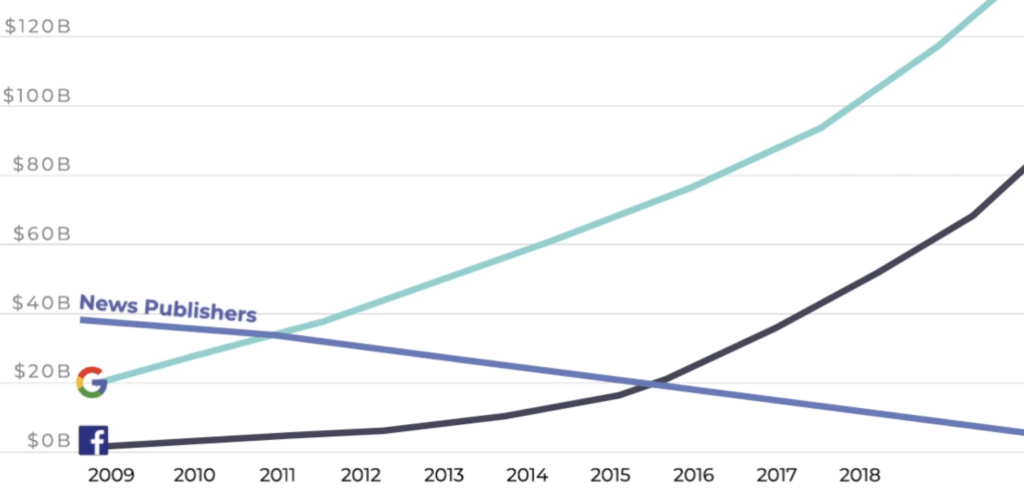Save Journalism Project: We Won’t Lay Off Big Tech Until Newsrooms Stop Layoffs
The journalism industry is facing an existential threat. After stabilizing in the three years following the global economic collapse in 2007-08, advertising revenue has consistently dropped nearly $2 billion per year in each of the last seven years. Over that same period, the tech giants’ advertising revenue exploded, with Google’s growing by $80 billion and Facebook’s by $50 billion. The tech giants are destroying the economic sustainability of the journalism industry.

News publishers made $14.3 billion in advertising revenue in 2018. If the next seven years witness the same declines as the last seven, advertising revenue will be completely gone and the free press will disappear with it.
This catastrophic collapse of revenue has had entirely predictable results, with newspapers closing down or scaling back, and the journalism industry shedding jobs at an alarming rate. Local news outlets play a critical role in our communities, exposing corruption in Louisiana politics, the sexual abuse of children at Penn State and Brigham Young Universities, and the cover up of Jeffrey Epstein’s sex trafficking ring. Millions of Americans are losing this important coverage and tens of thousands of journalists are losing their jobs.
The death grip the tech giants have on digital ad revenue is not the only challenge facing the journalism industry. But it is the crisis that is now unquestionably threatening the economic sustainability of the free press. And it’s why we launched the Save Journalism Project in June.
Since then, the Save Journalism Project has broken through with its efforts to preserve the foundation of the free press in the face of big tech’s increasing monopolistic power. Co-founders Laura Bassett and John Stanton are prominent journalists who were working at HuffPost and BuzzFeed, respectively, before they were laid-off in January 2019. They are not alone. Across the country, news outlets new and old are closing down such as The New Orleans Times-Picayune, The Youngstown Vindicator, Pacific Standard, and Governing. It is clear that while reporters at these and other outlets were churning out some of the biggest stories, stories that led to changes in state and federal law and the trajectory of current events, there simply wasn’t enough money to sustain their operations.
Laura and John provided testimony to committees in both the Senate and House, highlighting the “crisis for our democracy” of the threat facing the economic sustainability of the free press. They concluded:
It’s uncomfortable for journalists to talk or write about ourselves, or to elevate an issue that’s in our own self-interest. We’re taught not to be the story. But as tech monopolies siphon off our revenue streams, it’s never been more necessary for us to link arms to fight for the health and future of our industry. One or two companies should not have the power to cripple the free press in the United States.
Congress, the Trump administration, and state governments have all taken notice. The House Judiciary Committee has begun an antitrust investigation of the tech giants and the first hearing focused entirely on how their monopolistic power is threatening the journalism industry. The Department of Justice has launched a major antitrust investigation of Google and Apple, while the Federal Trade Commission is conducting its own investigations of Facebook and Amazon. And a coalition of 48 state attorneys general recently announced an antitrust investigation of Google.
We did not get in this position overnight, and there is no easy fix to this crisis. Solutions must begin with the federal government recognizing the unique position of the journalism industry as the only business written into the Constitution. That requires the protection of the free press to include protecting its economic sustainability in addition to preventing government interference in its content. Such an emphasis would result in legislation and regulation that would ensure that news publishers can monetize their content in the digital era. Some examples:
- The Journalism Competition and Preservation Act, a bipartisan bill introduced by Representatives David Cicilline, Doug Collins, and Mark DeSaulnier that would allow news publishers safe harbor from antitrust law to band together and collectively negotiate better revenue returns on their digital advertising.
- Amending Section 230 of the Communications Decency Act of 1996 to level the playing field between major online platforms and news publishers. Under that law, technology companies are given special liability protection from the content published on their platforms while news publishers remain liable for the content they produce.
- The federal government should regulate web browsers and other platform products to ensure an open and competitive marketplace in which news publishers can monetize their content. Owners of infrastructure on which commerce depends, such as the railroads and telephone lines, have long been regulated to prevent them from rigging the rules of its use to harm competitors and industries that rely on open access. The FTC should pay particular attention to unilateral changes made by tech companies that will harm news publishers’ two main revenue streams of subscriptions and advertising, such as changes that affect the distribution of news content, the ability of news publishers to enforce subscription limits, or the interoperability of advertising products.
The closing of once-venerable newspapers and the loss of jobs has become an all too common feature of our current media environment. When papers shut their doors or lay off journalists and other staff, it makes some news. But the existential threat that the journalism industry faces from big tech is not getting anywhere near the amount of coverage it should. News publishing is the only business written into the Constitution. It is one of the foundations of our democracy. And it is on the brink of disappearing entirely because the revenue model on which it has existed for centuries is being smothered by Google and Facebook.
It’s time more publications answer the call from Laura and John and give this crisis the attention it deserves.